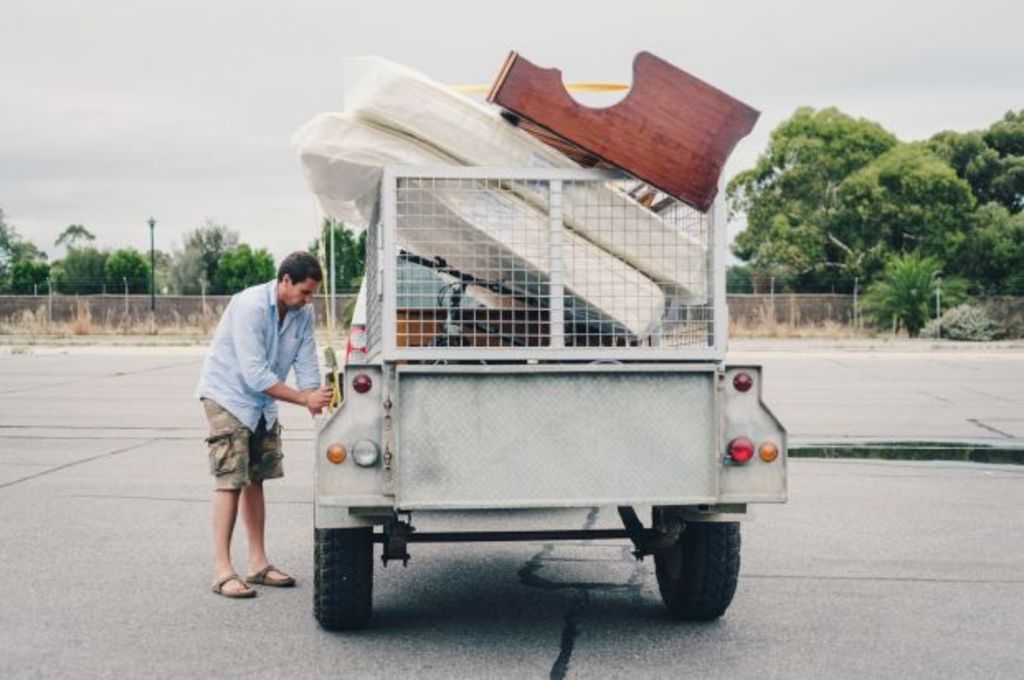The items you can’t just throw on to a removal truck

“We can’t move that, it’s too dangerous,” were the last words that Shirley Potter needed to hear on her moving day.
Already struggling with moving out of a rental she had lived in for over a decade, Potter, who is legally blind, was not expecting to have her removalists decline to move several items.
Executive director of the Australian Furniture Removals Association (AFRA), Joe Lopino, confirms that it’s a common misconception that removalists will carry any item. “To avoid disappointment on moving day, it is important to know what items can and can’t be moved by the removalist,” he says.
For Potter, the items in question were a sword collection and a collection of used paint tins.
It would be easy to assume that the sword collection would be refused on grounds of safety, however, in this case danger was not the removalists concern. “They’re not weapons, they’re not sharp,” Potter says. “They are collectables that go on a wall.”
The reason the swords were refused removal was that they were too fragile to be carried safely in the truck, and too valuable to be covered under the insurance.
“Valuables, including jewellery, cash and ID documents, should be transported directly by the individual,” says Lopino. “Fragile items may not be strong enough to be carried in a truck.”
Potter’s paint tins, along with pool chemicals and gas bottles, were another removalist no-no. “In summer, the temperature in a truck can get well above 50 degrees and even closed containers can pose a real risk,” says Lopino.
- Related: A stress-free guide to moving house
- Related: Moving house: hire removalists or DIY?
- Related: Here’s what to avoid when hiring removalists
LPG gas bottles are another commonly encountered problem. “We had nearly completed loading our three-tonne truck when my co-worker came across an LPG gas bottle connected to the barbecue, which was not listed in our agreed upon checklist of ‘items for removal’,” says Mike*, a Melbourne removalist. “We returned from loading garden furniture to find him releasing the LPG gas out of the tank.”
LPG gas is heavy so doesn’t dissipate into the air, meaning that this situation involved real threat of an explosion. Emptying a gas bottle prior to moving is an option but only by a certified Gas Cylinder Test Station.
The key is for those moving house is to be aware of potentially dangerous goods among their possessions and to discuss these items with their chosen removalist prior to move day. “The worst thing for a consumer is to wait until moving day and then say ‘by the way…’,” says Lopino.
CEO of Two Men and a Truck, Catherine Kuipers, agrees that these prohibited items can be problematic. “If we go out to a home to assess a move, these types of items are identified,” she says, noting that the company’s moving checklist includes suggestions like emptying fuel from lawnmowers and other machinery.
Though many removalist terms and conditions include a clause on dangerous goods, Kuipers realises that people in the throes of moving house are unlikely to take the time to read these fully.
Potter, who ended up having to call on friends to help her move the items that were left behind by the removalist, agrees that increased awareness of the fact that some goods are not able to be safely moved would have helped her prepare.
She feels that her removal company, which she declines to name, did not fulfil their responsibility in identifying dangerous or other special items. “I know the supervisor had seen the swords displayed on the wall during a walk-around visit before moving day.”
What will Potter do next time she moves? “I will ask more questions well ahead of time,” she says. “I will want to know about everything before we even start.”
* Names have been changed
Tips for a smooth moving day:
- Valuables should be moved only by you.
- Firearms and ammunition are a no-go for removalists even if secured in a gun safe.
- Paint tins should not be moved – Lopino recalls an instance where the vibration of the truck caused the lids to fly off, resulting in paint covering nearly everything in the truck.
- Some plants cannot be taken over state borders and all plants can die or suffer in the truck, even on short trips.
- Disassemble flat-packed furniture.
- Alert your removalist to any unusual or specialist items well before moving day. AFRA members receive special training in preparing and moving complex items such as grandfather clocks.
We recommend
States
Capital Cities
Capital Cities - Rentals
Popular Areas
Allhomes
More







